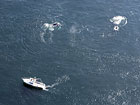

 | |||||||||||||||||||||||||||
|
|
Journals 2005/2006Debra Slade-Redden
July 12, 2005 The sun shone brightly through the windows at 4:45 a.m. It was time to get up and load the car. We arrive at the dock at 5:30 and waited to hear the plans for the day. Our plan was to run normal stations, on the transect, until mid-afternoon, rest, fish, and eat. Afterwards we would do a couple more stations, sleep, and begin again at sunrise. My job today was to operate the winch to lower and raise the equipment. Everyone soon found out that I was skilled in using large equipment. We deployed a newly fixed piece of equipment called TAPS (Tracor Acoustic Plankton Sample) requiring a new crewmember, Adam, a graduate student from the University of Maine that had been trained to use TAPS. Another new crewmember was Heather McCrae, employee of the New England Aquarium, who used the logger and did observations with Moriah. Kerry was flying in the plane for the aerial survey today.
The day went as planned deploying equipment and bringing it back up. Excitement abounded when we ran into a pod of humpback whales. We follow them for about 30 minutes as they fed. Our acoustical fish finder we were towing showed an abundance of fish in the area. We finally finished our last station around 4:30 p.m., a total of 7 completed stations. A pod of about 25 White-sided dolphins were interested in our boat and swam around our ship. There was a mother with a newborn calf that was only a few days old. It still possessed fetal folds on its body. Scott and Mackey attached a light to our mast for the overnight stay. Adam was fishing and caught a cod to add to our supper. Heather gutted and filleted the fish as Adam taught her the process. Cod is known for having parasite problems so Adam removed any worms and sea lice while holding it up to the sunlight. Supper consisted of fish chowder and cooked cod. After supper we took off to do a few more stations. We noticed many humpbacks feeding and then noticed red patches in the water. Upon closer observation, we discovered it was Calanus (copepods) being preyed upon by Krill. Nick decided to run a plankton tow through one of these patches. The tow only lasted a few minutes but we trapped about 2 gallons of plankton. As we watched Nick deal with the plankton, an amazing thing occurred, herring were feeding on the krill. There were thousands of herring in each of these patches. It sounded like popcorn or a heavy rain. We run the TAPS two more times and now we were watching humpbacks lunge feeding everywhere. We noticed there were more herring feeding frenzies and decided to tow the fish finder. The fish finder showed there were many fish at our location. On the computer you could observe thousands of fish on the bottom shaped like a volcano ready to explode to the surface. After the fish came to the surface they fed and then disappeared back to the bottom.
Out of the plankton tow, Nick made me a plankton sample to share with my classroom. I plan to spend time discussing the differences in plankton occurring in the Atlantic Ocean and hopefully will get to do some plankton tows with my class.
Sunset was gorgeous and we spent time enjoying the peace and quiet. It was getting late and we all claimed our spots for sleep. We discussed doing watches but in the end, Mackey and Scott split the watch because they decided we needed our sleep in order to work the next day.
|
||||||||||||||||||||||||||








